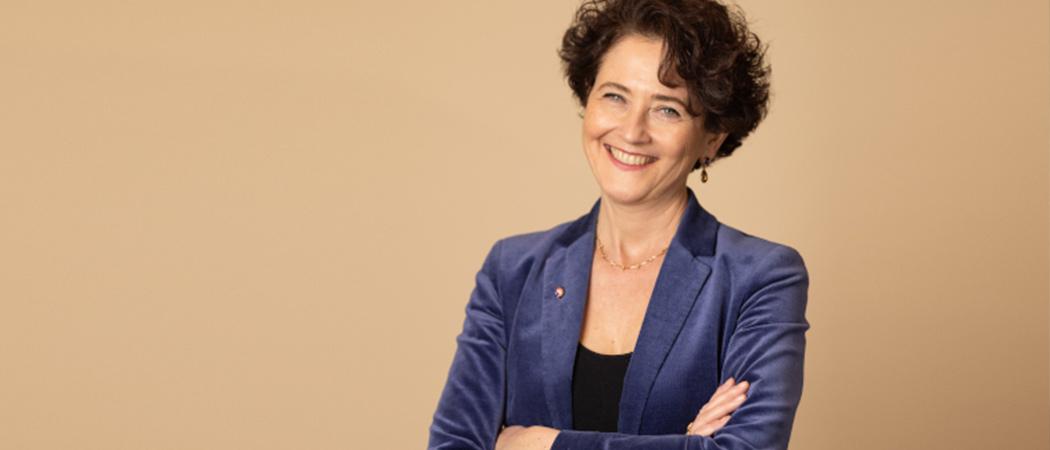Science led the way out of the COVID-19 pandemic and can rise to other challenges, as long as there is sustained investment in research and research infrastructures, the head of the European Molecular Biology Lab tells Science|Business

Edith Heard, EMBL Director General. Credit: Kinga Lubowiecka
The response to crises enveloping the world is a hot subject at the International Conference on Research Infrastructures (ICRI) in Brno this week, with speakers suggesting science does have the answers.
The dominant narrative around the COVID-19 pandemic implies the world was not prepared for a major virus outbreak. But Edith Heard, director general of the European Molecular Biology Laboratory (EMBL), believes science was ready, as was clear in the response.
When the virus started to spread, researchers set up data sharing platforms and built on existing research, knowhow and technology platforms to track the evolution of the virus as it spread around the world, and to develop vaccines, therapies and diagnostics at a record speed.
Much of this relied on existing research and research infrastructures, Heard said. Speaking to Science|Business at the Brno conference, Heard said it is time to take stock and draw on this experience, as the world faces up to the energy crisis, antibiotic resistance and climate change.
EMBL acted swiftly in response to COVID-19, launching new initiatives and repurposing existing facilities to provide a range of direct research and support services, including in collaboration with institutes in the member states. The lesson is clear: invest in research infrastructures to ensure the necessary know-how is there. “I really think this is the only way to be ready for what hits us next,” Heard said.
To fully capitalise on these investments, infrastructures should be kept as open to researchers as possible, to ensure ideas are circulating and stress-tested. “From my perspective, the more scientists we get working with infrastructures, using them, inputting to them, the better we will be in preparing for the next challenge,” said Heard. “I’ve seen it in action. When people come in the same space to work together, not only do you solve problems faster, but you come up with solutions for the future.”
Bottom-up solutions for the next crisis
The next crisis might have nothing to do with viruses. There’s an energy crisis unfolding in Europe, the imminent and ever-present threat of a climate catastrophe, and an economic downturn looming. When it comes to health, the world is still not out of the woods with the COVID-19 pandemic, monkeypox is still spreading, and antibiotic resistance is a major problem.
Heard believes it won’t be top-down diktats on what research to pursue that will help tackle the challenges, but letting scientists decide what to do, and ensuring the necessary talent and infrastructures are in place.
“Science is about discoveries and allowing discoveries to happen with infrastructures that will allow you to take that extra step. My plea is that if there is going to be an investment by governments and by the EU, it should be in these enabling entities where people can accelerate research,” Heard said.
Vladimír Balaš, Czech education minister, echoed this thinking as he stressed the importance of giving scientists the freedom to decide what’s important. “Scientists also live in the real world and they know what the challenges are and what would be interesting to research. And they are flexible and able to quickly react to challenges that are acute,” he told delegates.
Crisis as opportunity
While the fundamental science was in place, it had to be marshalled and translated at breakneck speed during the COVID-19 pandemic. Global cooperation took centre stage. At an EU level, the importance of coordination on health was underlined. The Commission launched an in-house pandemic preparedness body, the Health Emergency Preparedness and Response Authority (HERA)
Pierre Delsaux, head of HERA was attending the Brno conference. He told Science|Business that next time around Europe will be prepared for a health emergency, thanks to a secured commitment at EU level. Other global events will not divert this focus, even if there’s a tendency for governments to kick into survival mode when a new crisis unfolds. “Once something is started in Europe, it’s difficult to stop it,” Delsaux said, citing the 2008 financial crash, after which governments have been much more careful in how they manage their budgets. “Once the next crisis hits, we’ll see the value of HERA,” he said.
HERA is working an electronic platform for the detection of health threats, and together with other EU agencies investing in R&I and helping stockpile medical countermeasures. There is a €1 billion per annum budget, including the money for research through Horizon Europe.
To maximise the value extracted from that, HERA is creating a network of laboratories to make knowledge sharing easier. It is in constant dialogue with scientists, most recently on developing a vaccine for COVID-19 that would be effective against an variant of the virus.
Heard stressed the importance of dialogue, saying scientists aren’t just there thinking about science. They’re also aware on what is needed to make science useful.
“No single entity that was set up by the government or the EU can capture that if they don’t talk to the scientists,” she said. “If we want something that makes sense for the future, there has to be a consultation with the scientists on the ground, thinking about it in a global sense.”
As with the COVID-19 pandemic, the unfolding energy crisis will lead to much-needed innovation in the sector. “In every crisis, there’s a silver lining. The pandemic showed it, and this energy crisis will show it too,” said Heard.





 A unique international forum for public research organisations and companies to connect their external engagement with strategic interests around their R&D system.
A unique international forum for public research organisations and companies to connect their external engagement with strategic interests around their R&D system.